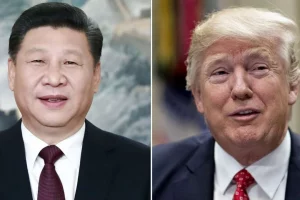Chaos & Order

US President Donald Trump has created chaos in international trade and economic order through his skewed and short-sighted tariff war. But, out of the chaos a new order is slowly emerging in which China is positioning itself as the pivot. Chinese President Xi Jinping’s ongoing tour of the South-Asian countries of Vietnam, Malaysia and Cambodia this week, days after the imposition of new tariffs by the US administration on 2 April point to this realignment of economic forces. The flip flops and contradicting messages emanating from the White House on the quantum of tariffs seem to have only strengthened the Chinese resolve to formulate its new international economic policy that is likely to be far more effective than its Belt and Road Initiative. The crude escalation initiated by the American President has only reinforced China’s belief that it must minimize its dependence on the United States and introduce an entirely new dynamic that will lead to a decoupling of the world’s two largest economies, which till date seemed impossible.
The world at large, including China, now recognises the risks posed by exposure to the American market. This has already spurred different countries to scout for new markets to replace American consumers.
Xi Jinping’s tour of Vietnam, Malaysia and Cambodia close on the heels of Trump’s tariff war shows that Beijing is seeking to strengthen its commercial ties with more reliable partners. The European Union and major emerging countries are also part of this strategy. Brazil has already surpassed the US as China’s leading supplier of agricultural products and it belongs to this category. China stands to gain as the wall of tariffs erected by Washington is forcing every targeted country to look elsewhere.
A favourite word of Trump is “smart,” but he does not seem to be acting smart as he is contributing to the emergence of a world aiming to bypass the US. Ironically, this significant realignment affects not simply trade. Washington’s withdrawal from international organisations and its avowed hatred for the established international order, time-tested alliances and American commitments, such as support for Ukraine against Russia, fit into this worldview.
Beijing can only be too pleased with America giving up its soft power that was once an integral part of its foreign policy. From China’s perspective an example of this is the abrupt closure of Radio Free Asia, which played a central role in informing the Uyghur community being brutally suppressed in China. By signaling that they are ready to relinquish, for whatever reason – weariness or fatigue – , the US is creating a space China may be too eager to fill.
The world has seen how since the beginning of Trump’s second term, Beijing is trying to project itself as a moral successor. However, if China succeeds in achieving its goal, this does not seem to augur well for countries like India, given China’s own track record of exploiting the resources in Africa and elsewhere. Beijing’s trade policy too aims to offload excess production at any cost because its sluggish domestic demand cannot absorb it. This poses a threat to jobs in Europe and many Asian countries. Xi’s disastrous human rights record remains a significant obstacle for many democracies, including European. Compromises with Beijing may appear to be necessary to offset American disorder, but China is a dubious ally and no one knows it better than India.
News